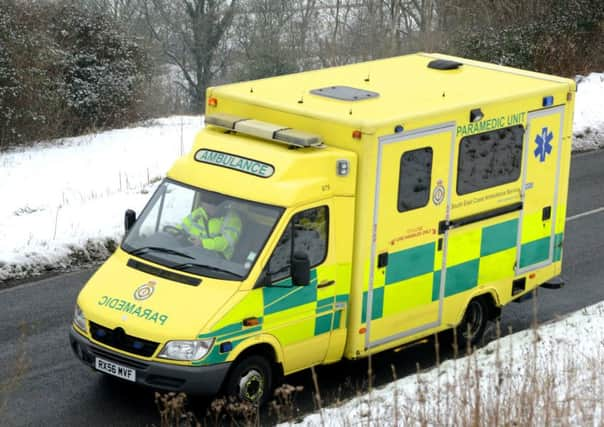SECAmb pilot aimed to improve patient safety


Paul Sutton, chief executive of South East Coast Ambulance Service (SECAmb)explained to East Sussex County Council’s health overview and scrutiny committee (HOSC) on Thursday why the organisation ran a controversial project last winter.
The project, called Red 3, is being investigated by health regulator Monitor.
Advertisement
Hide AdAdvertisement
Hide AdIt ran from December, 2014, to February, 2015, and allowed an extra ten minutes for assessments before ambulances were dispatched to some urgent calls.
Mr Sutton said the retriage process was implemented in response to ‘consistent’ pressures across the patch.
“One of our biggest concerns, and it sounds daft now, was ebola,” he said.
“We were having a scare every couple of days about people coming off planes at Gatwick.
Advertisement
Hide AdAdvertisement
Hide Ad“Our big concern was the changing advice from the centre about personal protection equipment.
“We did manage some ebola patients during that period. We also had a national strike. We had Brighton and Medway hospitals concerning us.
“We were seeing the lowest survival rates from cardiac arrest that we had seen that year in November last year,” Mr Sutton added.
“We were very concerned about the safety of our 999 response.
Advertisement
Hide AdAdvertisement
Hide Ad“For every minute that goes by mortality or death increases. The quicker we are the more [patients in cardiac arrest] we can find in a shockable, reversible or survival condition.”
Mr Sutton said there were queues of 80 to 100 patients waiting for ambulances which were ‘stuck at hospitals’ or out on other calls.
The health boss added ambulances were responding to ‘inappropriate’ calls transferred from NHS 111, which gave the trust ‘low confidence’ in some of the calls coming from NHS 111.
“Some of those didn’t need responding to at all,” he told councillors. We put some of our most experienced clinical decision makers to triage and determine which patients had the highest priority.”
Advertisement
Hide AdAdvertisement
Hide AdThe trust said it could be confident about the accuracy of call categorisation during non-peak times but call volume at weekends was higher.
Mr Sutton said: “When the volume of calls between 8am and 12pm on a Saturday is 7,000 calls, 700 of which are transferred to the 999 system, we are slightly less confident and that is why we need additional clinicians to manage this queue as well as the calls coming in from 111.”
He acknowledged the pilot was not handled well and was not put through the trust’s governance process.
Monitor, which was investigating the trust, has now appointed Deloitte to review the scheme. Chairman Michael Ensor said he was ‘mindful’ Monitor has not published its findings but said the committee would discuss it next year.